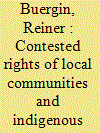| Srl | Item |
| 1 |
ID:
142716


|
|
|
|
|
| Summary/Abstract |
The conceptualization of interrelations between biological and cultural diversity since the 1980s indicates a biocultural turn in discourses and policies regarding nature conservation, sustainable development, and indigenous peoples. These interrelations frequently manifest as conflicts between local communities who derive their livelihoods and identity from their lands and resources, and external actors and institutions who claim control over these areas, invoking superior interests in nature conservation, development, and modernization. In these asymmetric conflicts over biocultural diversity, framed in discourses that demand the preservation of both biological and cultural diversity, the opportunities for local communities to assert their claims crucially depend on external discursive and legal frameworks.
|
|
|
|
|
|
|
|
|
|
|
|
|
|
|
|
| 2 |
ID:
144918


|
|
|
|
|
| Summary/Abstract |
Approaches and instruments focused on market mechanisms and private enterprises, including private protected areas, are promoted as ways to resolve global environmental and developmental problems. In Indonesia, Ecosystem Restoration Concessions (ERCs) have been developed as a new market-oriented governmental instrument to counter current deforestation processes and to restore forest ecosystems. Conservation and development organizations, along with state authorities, view ERCs as a highly promising instrument in Indonesia and in other countries as well. Experiences with ERCs are still limited, however, and their viability is uncertain. The implementation of ERCs in Indonesia has been controversial and the impact of ERCs on forests and forest-dependent communities has been fiercely disputed. This article explores these conflicts and disputes with a focus on the Harapan ERC and weighs the relevance of ERCs for German development cooperation. The improvement of the accountability of such projects and the implementation of mediation facilities are emphasized as prerequisites to establishing such market-oriented instruments according to international standards of nature conservation, the rights of indigenous and local populations, and sustainable development. The author concludes that decisions about strategies and instruments applied in forest-related development cooperation must involve a reconsideration of the mindsets that currently determine conservation approaches and development cooperation.
|
|
|
|
|
|
|
|
|
|
|
|
|
|
|
|